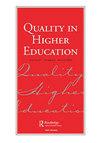Student satisfaction with honours programme in Azerbaijan
IF 1.5
Q3 EDUCATION & EDUCATIONAL RESEARCH
引用次数: 2
Abstract
ABSTRACT In 2014, the Ministry of Education of the Azerbaijan Republic launched an honours programme in several universities to introduce the advanced curriculum and interactive teaching methodology. The purpose of this research is to evaluate the success of the programme via the satisfaction level of the honours students with the delivery of the promised purposes of this programme, such as curriculum, teaching methodology and the programme administration in general. Preliminary results show that honours students are satisfied with each of those variables. Moreover, to understand whether the satisfaction of the students is purely due to the structure of the honours programmes, the satisfaction level of honours students was compared with that of non-honours students from the corresponding degree programmes. The results showed that honours students are more satisfied than the non-honours students in all the above-mentioned criteria.学生对阿塞拜疆荣誉课程的满意度
2014年,阿塞拜疆共和国教育部在几所大学推出了一项荣誉计划,以引入先进的课程和互动教学方法。本研究的目的是通过荣誉学生对该计划承诺目标的满意度来评估该计划的成功,例如课程,教学方法和一般的计划管理。初步结果表明,优等生对这些变量都很满意。此外,为了了解学生的满意度是否纯粹是由于荣誉课程的结构,我们将荣誉学生的满意度与相应学位课程的非荣誉学生的满意度进行了比较。结果表明,优等生对上述各项指标的满意度均高于非优等生。
本文章由计算机程序翻译,如有差异,请以英文原文为准。
求助全文
约1分钟内获得全文
求助全文
来源期刊

Quality in Higher Education
EDUCATION & EDUCATIONAL RESEARCH-
CiteScore
3.30
自引率
14.30%
发文量
32
期刊介绍:
Quality in Higher Education is aimed at those interested in the theory, practice and policies relating to the control, management and improvement of quality in higher education. The journal is receptive to critical, phenomenological as well as positivistic studies. The journal would like to publish more studies that use hermeneutic, semiotic, ethnographic or dialectical research as well as the more traditional studies based on quantitative surveys and in-depth interviews and focus groups. Papers that have empirical research content are particularly welcome. The editor especially wishes to encourage papers on: reported research results, especially where these assess the impact of quality assurance systems, procedures and methodologies; theoretical analyses of quality and quality initiatives in higher education; comparative evaluation and international aspects of practice and policy with a view to identifying transportable methods, systems and good practice; quality assurance and standards monitoring of transnational higher education; the nature and impact and student feedback; improvements in learning and teaching that impact on quality and standards; links between quality assurance and employability; evaluations of the impact of quality procedures at national level, backed up by research evidence.
 求助内容:
求助内容: 应助结果提醒方式:
应助结果提醒方式:


